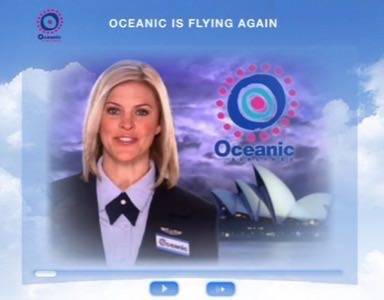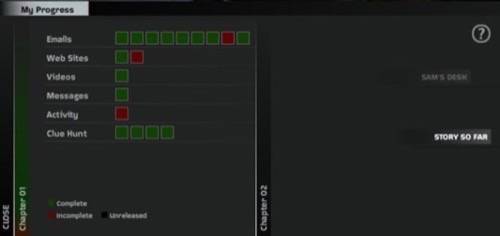It begins with billboards spotted in exotic places like Knoxville, Tennessee and Ames, Iowa and posted onlineby curious Lost fans. The billboards advertise a URL, “FlyOceanicAir.com.” Upon visiting the website, you are sucked into an adventure involving multiple websites, video diaries, photos with text hidden among the pixels, clue hunts, and strategy games. You can even call a toll-free phone number and get progress updates about the search for missing Oceanic Flight 815. Interesting characters and mysteries keep web players engaged and new content is posted at seemingly random intervals, forcing frequent check-ins to see if there’s anything new.

So begins Lost’s second Alternate Reality Game, a follow up to this summer’s “The Lost Experience” game, which spun clues deep into websites – like those belonging to advertising partners Sprite, Jeep, Monster.com, and Verizon.
The new game, dubbed “Find815” in reference to the game’s main website, began January 1st to promote the new season of Lost.

Crafty fans soon discovered that one of the game’s websites was registered to a group called Hoodlum, based in Brisbane, Australia. (Oh, and Hoodlum’s CEO is Tracey Robertson and an in-game email to the main character, Sam, happens to be from a “Tracey R.,” conspiring fans point out.)
Having been in the business for nearly a decade, Hoodlum is a company that was ahead of the curve when it came to multi-platform entertainment than spans beyond TV to mobile phones, the web, and even “real” life.
Hoodlum’s website showcases some of their work and their press releases highlight how they created, developed, and produced their multi-platform, interactive media creations. Among the solutions for their clients, Hoodlum mentions that they offer “a unique tool to track and measure the engagement of users.” There are no details on what that tool may be, but we can only guess that it’s something a bit more advanced than a tracking cookie.

Hoodlum’s core technology is called INCA (Interactive Net-based Channel Administration), a proprietary system which gives them the ability to produce projects on time and within budget while tying together content administration, platform integration, and final delivery. Within INCA, there are modules like user management, content management, approvals, game engine, characters, and scripts – all of which combine to run the game.
Selling themselves as a one-stop shop for these types of projects, Hoodlum offers solutions for all areas of a project, from conception to strategy to creative to production and delivery. Founded in 1999, Hoodlum’s founders claim to be “evangelists for interactive TV,” something the U.S. wants, “but doesn’t quite understand,” they say.
Well, we may have to learn.
The new, “New Media”
In the U.S., the TV writers strike continues with no end in sight, leaving the door open for companies specializing in other types of entertainment to grab a foothold in the big business of American entertainment. The release of Halo3 proved there is more than enough room for alternative entertainment mediums beyond scripted television to make profits.
When all that’s left of TV is poor-quality reality shows and other mindless filler, more sophisticated viewers will turn their attention away from the tube, likely going online instead in search of more stimulating entertainment. Companies like Hoodlum, whose business model is producing this new type of “blended” entertainment, will be poised to become the next big media giants – while the major networks continue to squabble over paying writers for webisodes.
In fact, Hollywood rag “Variety” reported earlier in 2007 of former Fox Interactive Media president, Ross Levinsohn, warning attendees at an industry event that “a strike would ‘open the window a little more’ for Internet creators to steal away audience from traditional media.” But NBC Entertainment/Universal Media Studios co-chairman Marc Graboff wasn’t concerned about online video cutting into TV series viewing. “There are so many cats flushing a toilet that you can watch,” he quipped.
Marc clearly hasn’t been paying attention to what ABC is up to.










